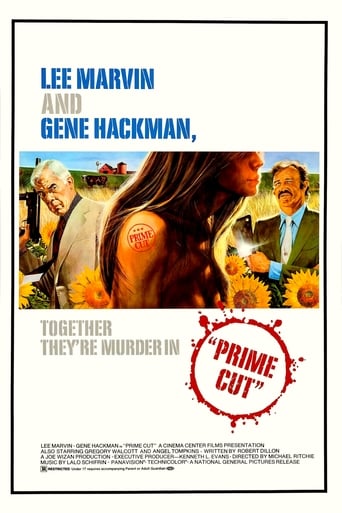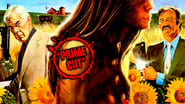jrpa
I was not going to write a review for this movie but this might be the best place for an opinion......... In particular, there is a scene where Marvin takes Spacek to a hotel/motel dining room and her gown is completely diaphanous -- i.e., transparent -- from top to bottom with some strategically placed ruffles front and back at and below the waist. Actually, with her character's apparent upbringing to become a sex-slave of a high bidder, she could be excused for not realizing how inappropriate the gown was for a public dining room. But Marvin can't use the same excuse. Also, Marvin's apparent unease that a man at a nearby table is staring and Marvin's stare-down of the man is pretty ridiculous. The waiters act as if everyone comes to dinner virtually naked.I enjoyed the movie, though. Everyone put in a good performance -- even the cannon fodder.....
writers_reign
To my personal knowledge Le Marvin played a totally sympathetic and totally non-violent character only once, in Jack Webb's superb Pete Kelly's Blues, but here his outwardly violent 'enforcer' displays significant sympathetic traits which add depth to his performance whereas Gene Hackman, an equally fine actor, is content to phone in a one-trick pony performance. Marvin is working out of Chicago but the bulk of the footage unspools in Kansas where Eddy Egan (the real-life cop on whose Hackman character Popeye Doyle in The French Connection was based) sends him to sort out Gene Hackman and recover the fifty large that Hackman has skimmed off the mob. As good as anything in the genre and Marvin is at his best.
ElMaruecan82
Days have been so hot lately I had to keep the air conditioner on all the night to prevent the room from turning into a human furnace. The trouble is that the machine is quite noisy and I had to reduce the volume on TV to let my wife sleep. Now, where am I going with these pointless details? I'm telling you.Yesterday I had the unpleasant discovery that the subtitles option didn't work on my "Prime Cut" DVD, so I could hardly hear what was said between characters. And the oddest thing is that it didn't undermine my understanding, let alone my enjoyment, not at all. Now I can see why Roger Ebert compared Michael Ritchie's movie to a comic strip: it's a movie defined by actions, reactions and interactions rather than a complex and intelligible plot, and in fact, what the film could afford was precisely what it needed. However, I doubt such a film can be possibly made today, when high-budgets and all-star casts became the new standard. Now, viewers need their minds to be blown and eyes stunned by the unusual, the stuff that elevates them, for 100 minutes, above their ordinariness and "Prime Cut" doesn't have such ambitious purposes. But it works for one simple reason: it's a film that knows where it goes, and trusts the presence of two great actors: Lee Marvin and Gene Hackman, with a honorable mention for Sissy Spacek, in her first and much promising film debut.These are faces that can do without wisecracks or clever one-liners, when you see them; you know exactly what role they're assigned to. Marvin is the experienced and bad-ass debt collector, Hackman is the charismatic corrupt cattle owner and slaughterhouse operator and Spacek is the innocent fair-haired victim. Marvin has the obligatory macho magnetism, Hackman that lively sparkle that makes him even more likable than his enemy and Spacek, as usual, magnificently conveys the poignant fragility of the poor rural girl, victim of unfortunate circumstances. And when these personality traits are all set-up, we confidently follow the action, trusting the actors' capacity to transcend the limits of these two-dimensional archetypes and provide great entertainment. But faces aren't sometimes enough and the director enriches a rather rudimentary narrative with a unique touch: the setting. Marvin belongs to the Chicago mob, but it's in Hackman's territory that the job must be done, in Arkansas. And don't be fooled by its bucolic appeal, the film hides an even dirtier business than anything you could find in the city. Indeed, the film doesn't feature drug dealers, no pimps, no ethnic gangsters, no screeching police sirens, no cats crawling under trash cans, the bad guys are all typically wasp with hair as blonde as the wheat fields their monotonous lives have always basked in. This is the underrated Mid-West, America's wheat-belt that gives the film an unlikely escapist value, almost Western-like, à la Sam Peckinpah with Lee Marvin replacing Steve McQueen or Warren Oates. And on the violence department, the film has nothing to envy from 'Bloody Sam' work.Danger is always present "naturally" starting with the impressive depiction of the slaughterhouse during the opening credits, when we follow the poor cows lead by the machinery that will turn them into steaks. I strongly suspect that among the millions of people who saw the film since its release, a few of them were converted to vegetarianism after witnessing the macabre spectacle. The credits ends with an intriguing oddity reminding us that it's still a gangster film: a shoe accidentally falls down from the sausage-maker. We get the point, whoever operates the slaughter house (it turns out to be Hackman) his enemies might end up sleeping with the cows. And this is not even the most shocking aspect of the plot that seems like a breath of fresh air, from the boring perspective of our prudish political correct days. In fact, the notion of meat and flesh is so ambiguous that even the titles "Prime Cut" carries some disturbing undertones. And the surprise comes less from the revelation than its graphic depiction: poor naked girls being held in cattle pens and auctioned to avid rich men. Please, think about it twice before branding it as 'misogynistic': no film today would dare such sights, but aren't they metaphorically significant? Isn't the only difference between that human slavery and what goes today contentment? Aren't girls eager today to be posing as fresh meats for greedy voyeurs, except that movies and social networks replaced the cattle pens? There's a thin line between forced and deliberate prostitution the film clearly exposes. It's made even more explicit through the fourth memorable character of the film: Angel Tompkins as Hackman's luscious wife, so amorally seductive that the word 'gold-digger' becomes a euphemism that doesn't fool anyone. It's for such gutsy moves like that that I will forever cherish the "New Hollywood" period when the humblest action-packed flicks weren't to be underestimated.And "Prime Cut" flirts with subversive subjects through little glimpses, but it knows we needn't to be too preached about, and action must prevail. And for the thrills, the film provides an unforgettable wheat-field chase where hand-in-hand Marvin and Spacek escape from a combine harvester. And despite their predictable outcome, the gunfights and final shootouts are not without surprises. Michael Ritchie also directed "The Candidate" the same year, a film I enjoyed but wished it dug a bit deeper in its subject, but for "Prime Cut", packed-up in less than ninety minutes, it was enough. So I would cheerfully compare "Prime Cut" to its defining element: meat. I enjoyed the film the way I enjoy a good steak: raw, with some tender sides, others 'harder-to-swallow", bloody the way it should, and not too overcooked. And when the plate is empty and you think you want more, a few minutes later, you realize you were plenty satisfied.
Hunt2546
Uncertain gangster drama that wastes considerable talents of Marvin and Hackman, two marvelous actors. Its one kick (or kink) wears thin fast: that's to ascribe the worst of moral degeneracy (drug trafficking and white slavery) to rural America and to blaspheme typical American romantic rural imagery with sin. Hackman is the villain, who hides his operations behind the facade of a bucolic Kansan cattle ranch, and director Michael Ritchie, displaying a true hack's banality, thinks he's onto something when he pitches gun battles in the middle of country fairs, sunflower and wheat fields. Oh, that's so heavy, man. (The fact that it's a 1971 pic, at the height of anti-war cynicism about American institutions, is no excuse.) Marvin is a Chicago enforcer sent to KC to collect on a $500,000 debt the rebellious countryboy kingpin (Hackman) has declined to pay. Everything about the movie is vulgar and tawdry, especially its image of a rural American community as center of the usual city sinspot of a "flesh n dope franchise." Still, I suppose it could have been a kind of crazed masterpiece if Ritchie had any gift at staging action. He hasn't; the gunfights are perfunctory and banal and defy any sense of logic or reality. A piece of suet.





